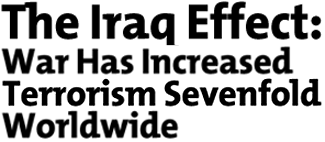|
By Peter Bergen and Paul Cruickshank “If we were not fighting and destroying this enemy in Iraq, they would not be idle. They would be plotting and killing Americans across the world and within our own borders. By fighting these terrorists in Iraq, Americans in uniform are defeating a direct threat to the American people.” So said President Bush on November 30, 2005, refining his earlier call to “bring them on.” Jihadist terrorists, the administration’s argument went, would be drawn to Iraq like moths to a flame, and would perish there rather than wreak havoc elsewhere in the world. |
The president’s argument conveyed two important assumptions: first, that the threat of jihadist terrorism to U.S. interests would have been greater without the war in Iraq, and second, that the war is reducing the overall global pool of terrorists. However, the White House has never cited any evidence for either of these assumptions, and none appears to be publicly available.
The administration’s own National Intelligence Estimate on “Trends in Global Terrorism: implications for the United States,” circulated within the government in April 2006 and partially declassified in October, states that “the Iraq War has become the ’cause celebre’ for jihadists…and is shaping a new generation of terrorist leaders and operatives.”
Yet administration officials have continued to suggest that there is no evidence any greater jihadist threat exists as a result of the Iraq War. “Are more terrorists being created in the world?” then-Secretary of Defense Donald Rumsfeld rhetorically asked during a press conference in September. “We don’t know. The world doesn’t know. There are not good metrics to determine how many people are being trained in a radical madrasa school in some country.”In January 2007 Director of National Intelligence John Negroponte in congressional testimony stated that he was “not certain” that the Iraq War had been a recruiting tool for Al Qaeda and played down the likely impact of the war on jihadists worldwide: “I wouldn’t say there has been a widespread growth in Islamic extremism beyond Iraq. I really wouldn’t.”
Indeed, though what we will call “The Iraq Effect” is a crucial matter for U.S. national security, we have found no statistical documentation of its existence and gravity, at least in the public domain. In this report, we have undertaken what we believe to be the first such study, using information from the world’s premier database on global terrorism. The results are being published for the first time by Mother Jones, the news and investigative magazine, as part of a broader “Iraq 101” package in the magazine’s March/April 2007 issue.
<< Breaking The Army << >> The Iraq Effect Pg. 2 >>
![]()
















